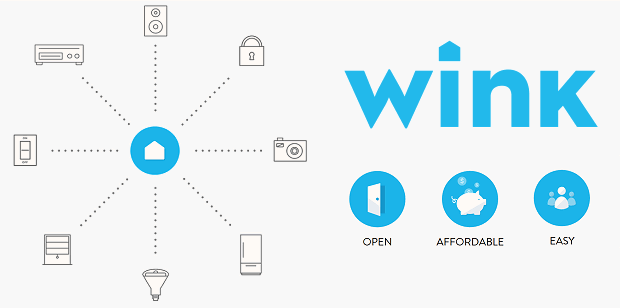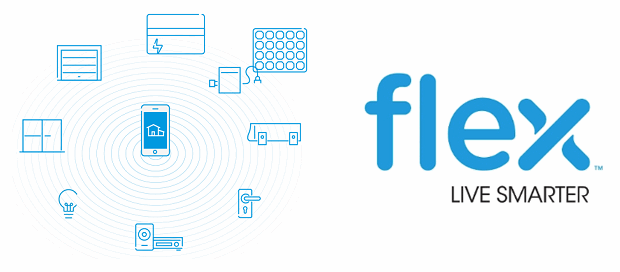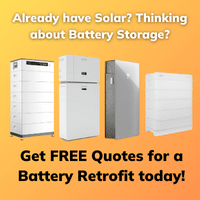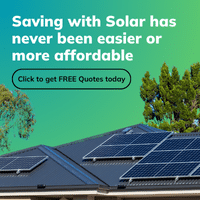What is home automation and the Internet of Things (IoT)? Where does solar power and battery storage fit into the concept of making a home smarter? Which are the leading companies in the smart homes space?
This guide provides a basic overview to how new smart home solutions will play an increasing role in boosting residential energy efficiency and convenient, connected living.
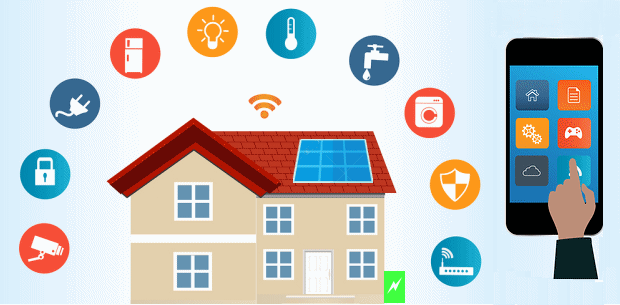
Most Australians would already be familiar with the benefits solar power provides; such as cutting energy bills and lowering a household’s carbon footprint – but along with battery storage, solar will also play an important part in home automation and the IoT.
What Is A Smart Home?
Smart homes feature internal systems that enable the control of appliances automatically and remotely via the internet using a device such as a phone.
A smart home is about connectivity. It’s a leap similar to the one we made going from “dumb” phones to smartphones that connected to the internet and enabled us to engage in all sorts of activities. Activities such as reading email, watching movies, streaming music and doing our banking.
A truly smart home is not only able to connect, but also “think” on its own. As information from multiple sources is combined and analysed, an intelligent home can start making smarter decisions. It can anticipate scenarios to a high degree of accuracy – but with you still having as much or as little control as you choose.
Leveraging the power of connectivity, a smart home’s potential in enhancing our lives and taking more control over our homes, including in the area of energy efficiency, is truly staggering.
What Is The Internet of Things (IoT)?
The Internet of Things, also referred to as IoT, is a loose term referring to the concept of devices connected to and operated via the internet; with home automation and “smart” solar + battery systems examples of elements of that ecosystem.
The concept of an “Internet of Things” has been around for quite a long time. The term dates back to the late 1990’s when it was applied initially to a proposal to track inventory levels in stores by adding an internet-connected sensor to products; with the goal of ensuring shelves were always stocked.
IoT technology continued evolving from that point, and has been accelerating at a very rapid pace.
There are already 15 billion connected devices worldwide. It’s estimated this number will grow to anywhere between 50 billion and 200 billion by 2020. The vast majority of those devices won’t be just computers or phones. They will be other types of appliances and equipment within smart homes and commercial premises.
IoT is already a part of our lives – it’s just that many of us don’t realise it yet!
What Are The Benefits Of Smart Homes?
Far from the days of smart home technology just being a whizz-bang toy for geeks and tinkerers, home automation done right can provide better energy efficiency and lower utility costs. It can even enhance your comfort and reduce labour.
Imagine having a garden irrigation system that responds to current weather conditions. You can have a thermostat you can control while you’re away from home, so your house is at a comfortable temperature when you return.
Using a smart home automation system, you could also have appliances and lights switching on and off at times and in varying sequences you choose. All the while maintaining control from anywhere you have an internet connection.
This can help you save on energy bills and also provide additional security. Internet-connected cameras can also help you keep an eye on things while you’re away. When you arrive home, you’ll be able to enter your house via a keyless lock.
A modern system will also learn from your configurations and habits, operating silently and seamlessly in the background; making some dreary and repetitive tasks just things of the past.
These applications aren’t just a possibility in the future, they are already in use now – and the potential is only really limited by our imaginations.
Just as exciting is the cost of creating a smart home is rapidly dropping, which is spurring on adoption of related technologies.
What Appliances Can Be Automated And Remotely Controlled?
All kinds of devices are already part of the Internet of Things; efficiently working away in smart homes, including:
- Security cameras
- Locks
- Lights
- Whitegoods (refrigerators, washing machines) etc.
- Video and audio equipment
- Home irrigation systems
- Residential weather stations
- Thermostats
- Air conditioners, fans and heaters
- and as mentioned, solar panel arrays and battery systems to help power them all
It’s not always a case of having to replace appliances to create a smart home. Add-on technology is available depending on the application. Choosing a smart home brand that has widespread product compatibility is an important decision that will help homeowners connect to more devices, and at a lower cost.
One Hub And Application To Control Them All
A challenge of having all these internet connected devices is making sure they speak the same language and adopt common standards.
If your coffee table is anything like many Australians’, you probably have a bunch of remote control consoles on it. One for the TV, another for the media player, maybe another for pay TV and yet another for your stereo.
As a result of the plethora of these devices, one of the common phrases uttered in Australian households is “where’s the (X device) remote?” Another common issue is picking up the wrong remote for the device you wish to control.
The same scenario could potentially occur in a smart home, with all your appliances having control by different hardware devices and applications on your phone. Before you know it, you’ll have the same mess on your phone as you do on your coffee table. Your smart home suddenly becomes a little dumb.
That’s where a “smart home hub” comes in. It’s a central brain of sorts that helps make home automation smarter, tidier, simpler and more energy efficient.
The world’s best selling smart home hub is manufactured by Wink. Like Energy Matters, Wink is a Flex company.
Wink has also created a very user-friendly single smart app to rule them all (so to speak) via the recently-released Wink Hub 2. This small box connects a home faster, more securely and more reliably. Wink’s in-app robots will also enable you to customize the way products talk to each other.
Most importantly, the system is very easy to use.
Wink’s popularity has grown rapidly and is now the largest DIY smart home platform. It has more than 1.7 million devices connected.
IoT & Security – An Important Consideration
While there have been cases of hijacking of internet connected devices for the purposes of carrying out mischievous activity, quality manufacturers such as Wink build high levels of security into their products.
However, as with the early stages of the internet, part of the security solution is education. And it’s quite simple in many cases, e.g. changing factory default passwords for the system or device.
Solar Power + Energy Storage – Making Homes Even Smarter
With the advent of smart inverters, energy monitors and new generation battery storage, solar energy systems have joined the Internet of Things and are an important piece of the puzzle of boosting energy efficiency in an automated, smart home.
Here’s an example – you may want to run your washing machine during the day; but this is when electricity is most expensive. An automated home could “instruct” a washing machine to only turn on if the weather is favourable for solar electricity generation. Or if your battery system has sufficient charge to support the cycle without needing to draw electricity from the grid.
Advanced solutions can help you monitor the performance of your home solar power system and your connected devices from your web browser or mobile device.
What is the future of smart home solar?
Smart technology and solar energy can create a self-sufficient household in the future. In the 21st century, there are barely any limits to technology, leading to more opportunities that make lives much easier.
Smart home automation can simplify everyday tasks, but it will still require energy to run. Solar energy can be used to create a loop where the property continues to generate energy from the sun.
Solar panels may also connect directly to smart home gadgets, such as programmable thermostats and light sensors.
Undoubtedly, the world needs to adapt to renewable energy eventually. With the continuous development of solar energy and smart technology, homeowners and business owners may fully benefit from what solar power offers in terms of efficiency and cost savings.
As a growing number of people consider smart home solar, a drastic change in the relationship between utilities and consumers is on the horizon. Sooner or later, the world will no longer need to rely on the grid to power homes.
Home Automation – Bringing It All Together
Getting home automation right is a matter of choosing the right devices, coupled with the right software from the right supplier and installed by the right people.
Energy Matters’ parent company, Flex (also known as Flextronics), is helping define the future connected home today. That’s why it has companies such as ours and Wink is under its wing.
Flex Living offers full residential energy and home automation solutions installed by experts. All under the one virtual roof.
Flex has established itself as a global leader in the smart homes space; with more than 100 sites in 30 countries, and 200,000 innovators; all helping customers big and small solve the challenges of the connected age.
In Australia, Flex Living connected homes start out with a solar and battery system. When the Wink smart hub becomes available for distribution in Australia, it can then retrofit to homes with existing solar panel and battery systems.
In summary, effective home automation is all about making all the pieces of the puzzle fit together and work together. With the expertise of companies such as Energy Matters, Flex and Wink will help lead the way in Australia’s smart home revolution.
Learn more about creating smart homes using the best in automation technologies. Learn more about Wink availability and distribution in Australia. Contact the Energy Matters team and submit an enquiry via our contact form.
Now is the right time to switch to Brisbane solar energy. We recommend seeking at least 3 solar quotes to ensure that you are getting the best deal and selecting the right solar installer in Brisbane whom you can trust. With this, you can guarantee a solar system in Brisbane that meets your energy needs.








